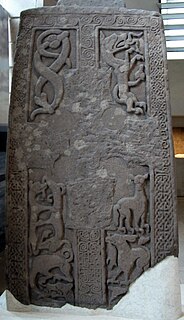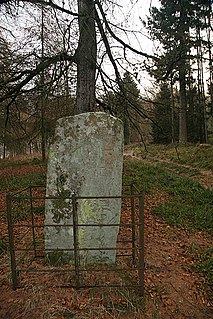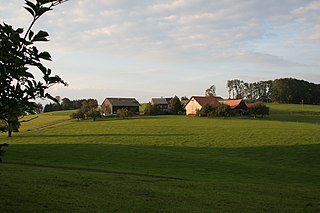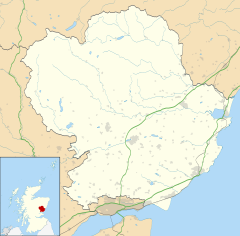
Glamis Castle is situated beside the village of Glamis in Angus, Scotland. It is the home of the Earl and Countess of Strathmore and Kinghorne, and is open to the public.

Earl of Strathmore and Kinghorne is a title in the Peerage of Scotland and the Peerage of the United Kingdom. It was first created as Earl of Kinghorne in Peerage of Scotland in 1606 for Patrick Lyon. In 1677, the designation of the earldom changed to "Strathmore and Kinghorne". A second Earldom was bestowed on the 14th Earl in the Peerage of the United Kingdom in 1937, leading to him being titled as the 14th and 1st Earl of Strathmore and Kinghorne.

Thomas Lyon-Bowes was the first child of Thomas Lyon-Bowes, Lord Glamis, and his wife Charlotte Lyon-Bowes née Grimstead, great-grandparents of Elizabeth Bowes-Lyon, who became Queen Consort in 1936. Although Thomas is recorded in Robert Douglas's Peerage of Scotland as "born and died, October 21, 1821", rumours began to circulate during the late 19th century that the child had been born deformed, and had therefore been brought up in seclusion hidden away in Glamis Castle in Angus, Scotland, giving rise to the soubriquet of the Monster of Glamis, or the Horror of Glamis.

The Bowes Lyon family descended from George Bowes of Gibside and Streatlam Castle (1701–1760), a County Durham landowner and politician, through John Bowes, 9th Earl of Strathmore and Kinghorne, chief of the Clan Lyon. Following the marriage in 1767 of the 9th Earl to rich heiress Mary Eleanor Bowes, the family name was changed to Bowes by Act of Parliament. The 10th Earl changed the name to Lyon-Bowes and the 13th Earl, Claude, changed the order to Bowes Lyon.

Clan Lyon is a Scottish clan.

Cecilia Nina Bowes-Lyon, Countess of Strathmore and Kinghorne was the mother of Queen Elizabeth The Queen Mother and maternal grandmother and godmother of Queen Elizabeth II.
Strathmore is a strath in east central Scotland running from northeast to southwest between the Grampian mountains and the Sidlaws. It is approximately 50 miles (80 km) long and 10 miles (16 km) wide. Strathmore is underlain by Old Red Sandstone but this is largely obscured by glacial till, sands and gravels deposited during the ice age. Its northeast to southwest alignment is influenced by the underlying geological structure of the area which reflects the dominant Caledonian trend of both the central lowlands and the Highlands of Scotland; its northern margin reflects the presence of the Highland Boundary Fault. Strathmore is fertile and has some of Scotland's best arable farmland, producing soft fruits and cereals.

Glamis is an unincorporated community in Imperial County, California. It is located 22 miles (35 km) northeast of Holtville, at an elevation of 335 feet.

The A94 is a major road in Scotland, United Kingdom. It connects Perth to Forfar. It has a junction at Glamis.

The Eassie Stone is a Class II Pictish stone of about the mid 8th century AD in the village of Eassie, Angus, Scotland. The stone was found in Eassie burn in the late 18th century and now resides in a purpose-built perspex building in the ruined Eassie church.

Eassie is a village located along the A94 road in Angus, Scotland. The church in Eassie is dedicated to Saint Fergus, a monk who worked at nearby Glamis. Eassie is noted for the presence of the Eassie Stone, a carved Pictish stone.

Castleton, officially Castleton Of Eassie, is a village in Angus, Scotland. This settlement is situated along the A94 road between Glamis and Meigle. One mile to the south is the village of Eassie noted for the presence of the Eassie Stone; this carved Pictish stone is dated prior to the Early Middle Ages. Slightly further to the south lies Ark Hill within the Sidlaw Hills.

Ark Hill is a mountainous landform within the Sidlaw Hills in Angus, Scotland. This location has been proposed as a windfarm for generating renewable electrical power. Approximately two kilometres to the north is the village of Eassie noted for the presence of the Eassie Stone; this carved Pictish stone is dated prior to the Early Middle Ages.

Charleston is a village in Angus, Scotland near Glamis.

The Glamis Manse Stone, also known as Glamis 2, is a Class II Pictish stone at the village of Glamis, Angus, Scotland. Dating from the 9th century, it is located outside the Manse, close to the parish church. It is inscribed on one side with a Celtic cross and on the other with a variety of Pictish symbols. It is a scheduled monument.

The Woodwrae Stone is a Class II Pictish Stone that was found in 1819 when the foundations of the old castle at Woodwrae, Angus, Scotland were cleared. It had been reused as a floor slab in the kitchen of the castle. Following its removal from the castle, it was donated to the collection of Sir Walter Scott at Abbotsford House. It is now on display at the Museum of Scotland in Edinburgh.

The Hunter's Hill Stone, otherwise known as the Glamis 1 Stone, is a Class II Pictish standing stone at Hunter's Hill to the south east of Glamis village, Angus, Scotland.

Baikie Castle, was a castle on the shores of the former Loch of Baikie, Angus, Scotland. The castle was owned by the Fenton family from the 13th century until the 15th century, when it passed to the Lyon of Glamis family. The castle was surrounded by a moat, with a drawbridge and stone causeway providing access to the castle. No remains were evident by the 19th century.















